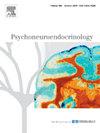Transgenerational transmission of prenatal maternal stress across three generations of male progeny alters inflammatory stress markers in reproductive tissues
IF 3.4
2区 医学
Q2 ENDOCRINOLOGY & METABOLISM
引用次数: 0
Abstract
Prenatal maternal stress may lead to adverse pregnancy outcomes such as preterm birth and low birth weight. Our team has demonstrated in multiple rat models that prenatal maternal stress modifies the expression of inflammatory and stress regulators in the uterus and that this is transgenerationally passed over multiple generations through the female progeny. In this study, we investigated if male progeny exposed to ancestral prenatal maternal stress could also transmit changes to cause fetal programming of reproductive organs, leading to adverse pregnancy outcomes. We created a paternal transgenerational prenatal stress rat model. Dams (F0) were exposed to chronic variable stress during pregnancy, and their F1 male offspring stressed in utero were bred with control females for two generations. Gestational lengths and litter sizes were unchanged. Elevated gene expression of pro-inflammatory molecules in the uteri of F2 and F3 offspring was observed. Uterine expression of stress markers in the F2 and F3 females also increased even though plasma corticosterone levels were unchanged. Changes in the testicular expression of inflammatory and stress markers were also transmitted through the paternal lineage. These changes, however, tended to bear anti-inflammatory and adaptive functions, indicating compensatory mechanisms at play. These results demonstrate that fetal programming of uterine and testicular gene expression patterns can be transmitted through male progeny exposed to prenatal maternal stress.
产前母亲压力在三代男性后代中的跨代传递改变了生殖组织中的炎症应激标志物
产前产妇压力可导致不良妊娠结局,如早产和低出生体重。我们的团队已经在多个大鼠模型中证明,产前母性压力会改变子宫内炎症和应激调节因子的表达,并且这是通过雌性后代跨代传递的。在这项研究中,我们研究了暴露于祖先产前母亲压力下的男性后代是否也会传递变化,导致生殖器官的胎儿编程,从而导致不良的妊娠结局。我们创建了一个父亲跨代产前应激大鼠模型。将妊娠期暴露于慢性可变应激条件下的母坝(F0),在子宫内应激的F1雄性后代与对照雌性杂交两代。妊娠期长度和产仔数不变。F2和F3子代子宫内促炎分子基因表达升高。在血浆皮质酮水平不变的情况下,F2和F3雌性的子宫应激标志物表达也增加。睾丸炎症和应激标志物表达的变化也通过父系传承。然而,这些变化往往具有抗炎和适应功能,表明代偿机制在起作用。这些结果表明,子宫和睾丸基因表达模式的胎儿编程可以通过暴露于产前母亲压力的男性后代传播。
本文章由计算机程序翻译,如有差异,请以英文原文为准。
求助全文
约1分钟内获得全文
求助全文
来源期刊

Psychoneuroendocrinology
医学-精神病学
CiteScore
7.40
自引率
8.10%
发文量
268
审稿时长
66 days
期刊介绍:
Psychoneuroendocrinology publishes papers dealing with the interrelated disciplines of psychology, neurobiology, endocrinology, immunology, neurology, and psychiatry, with an emphasis on multidisciplinary studies aiming at integrating these disciplines in terms of either basic research or clinical implications. One of the main goals is to understand how a variety of psychobiological factors interact in the expression of the stress response as it relates to the development and/or maintenance of neuropsychiatric illnesses.
 求助内容:
求助内容: 应助结果提醒方式:
应助结果提醒方式:


